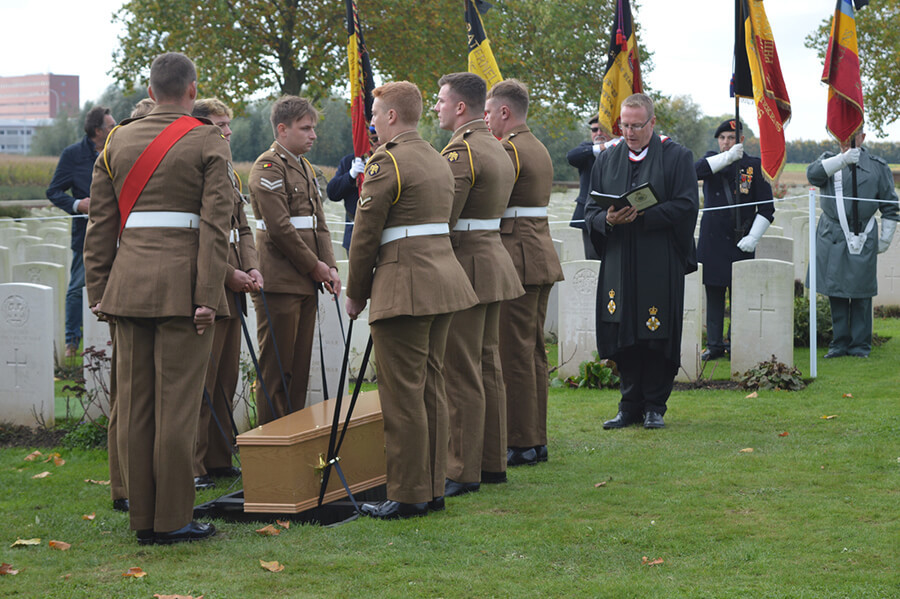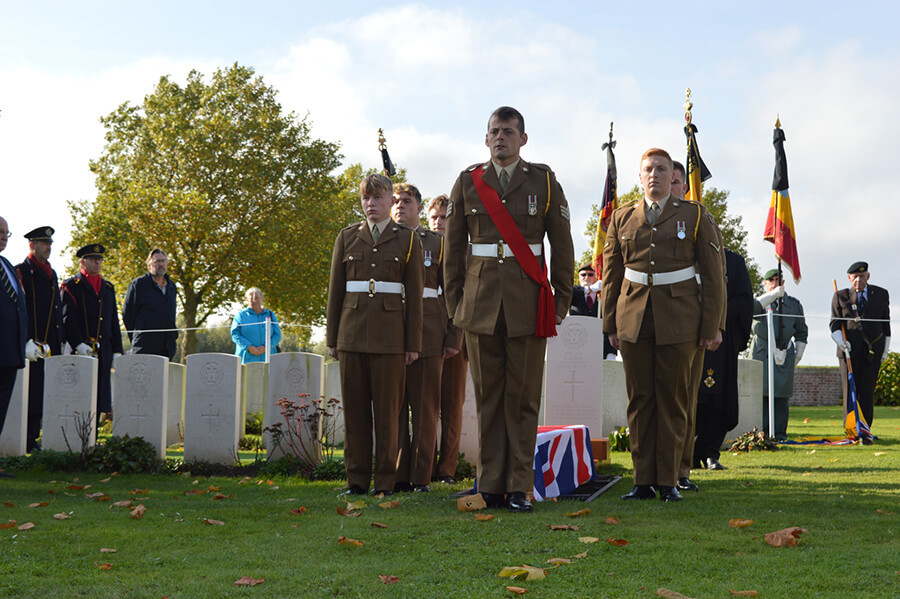04 November 2021
Lance Corporal Robert Cook reburied at New Irish Farm Cemetery
On Wednesday 27 October Lance Corporal (L/Cpl) Robert Cook of 2nd Battalion The Essex Regiment, was finally laid to rest with full military honours in the presence of his family. The service was organised by the MOD’s Joint Casualty and Compassionate Centre (JCCC), also known as the ‘MOD War Detectives’ and was held at the Commonwealth War Graves Commission’s (CWGC) New Irish Farm Cemetery, near Ypres in Belgium.

L/Cpl Robert Cook was born in Bishop Wilton in the East Riding of Yorkshire, on 6 June 1876 and was one of seven children. From his surviving family, his great-nephew Arthur Cook and his great-niece Sally Cooper both attended as well as members of C ‘Essex’ Company of 1st Battalion The Royal Anglian Regiment, who supplied both the bearer and firing parties for the ceremony.
Liz Woodfield, CWGC Director of External Relations, said: “Lance Corporal Robert Cook had a remarkable life story and his experiences in South Africa are reflected in the personal inscription his family have chosen to be engraved on his CWGC headstone. His now lies alongside the men he fought and died with during the First World War, in the Commonwealth War Graves Commission’s New Irish Farm Cemetery. We remember his sacrifice and will care for his grave and memory with dedication, in perpetuity.”
Rosie Barron, JCCC said: “It has been a privilege to have worked with The Royal Anglian Regiment to organise this burial service for LCpl Cook and to have buried him in the presence of his family.
“None of this would have been possible without the help of Maj Ret’d Peter Williamson MBE and The Essex Regiment Museum, who painstakingly searched their war records ultimately leading to the identification of this casualty as LCpl Cook.”
Arthur Cook, great-nephew of L/Cpl Cook said: “It is absolutely amazing that someone who gave his life over a hundred years ago, along with many thousands of others, should be remembered in such a way. He has laid unidentified in an unmarked grave for over one hundred years and we are now able to commemorate him, remember his contribution to British history, and record part of his story on a headstone for future generations to see.
“Our thanks go to the Reverend Gary Birch CF and all the members of the Royal Anglian Regiment who have taken part in this service. The fact that members of Robert Cook's family are here in Ypres and able to finally lay him to rest in a marked grave with the dignity and honour that he deserves is all due to the excellent detective work of Rosie Barron of the MOD’s Joint Casualty and Compassionate Centre who we cannot thank enough.”
Between 2014 and 2015, 24 sets of remains were found during construction work at what is believed to have been the site of Irish Farm Cemetery on the outskirts of Ypres. Irish Farm was in use as a Regimental Aid Post in May 1915 at the time of L/Cpl Cook’s death. It had previously been thought that after the Great War, the graves in Irish Farm Cemetery had all been moved to New Irish Farm Cemetery, a short distance away – 19 of these soldiers were buried in September 2017 with full military honours. A further four soldiers were buried in 2019 after further investigation by the JCCC.
The final set of remains were found with shoulder titles and a cap badge of The Essex Regiment as well as a medal ribbon bar indicating that this soldier had received the British South Africa Company Medal 1890-1897, the Queen’s South Africa Medal 1899-1902 and the King’s South Africa Medal 1902. Based on the location where these remains were found, it was believed this casualty likely belonged to 2nd Battalion The Essex Regiment.
The battalion had arrived in the frontline close to Irish Farm on 30 April 1915 and remained in the area until July. On 2 May 1915, the day of L/Cpl Cook’s death, the battalion was attacked with gas, causing panic and confusion in the line. Gas was first used by the Germans on 22 April 1915, and no protection against this new weapon was yet in place. The enemy then attacked the line.
Too many casualties of 2nd Battalion The Essex Regiment were missing from during this period to carry out DNA testing, so JCCC sought further assistance from Major (Ret’d) Peter Williamson MBE at The Essex Regiment Museum in narrowing down which of the missing soldiers may have received the three South Africa medals. Based on the medals found with his remains and information from the Essex Regiment Museum archives, Peter was able to confirm that only L/Cpl Cook would have done so.




